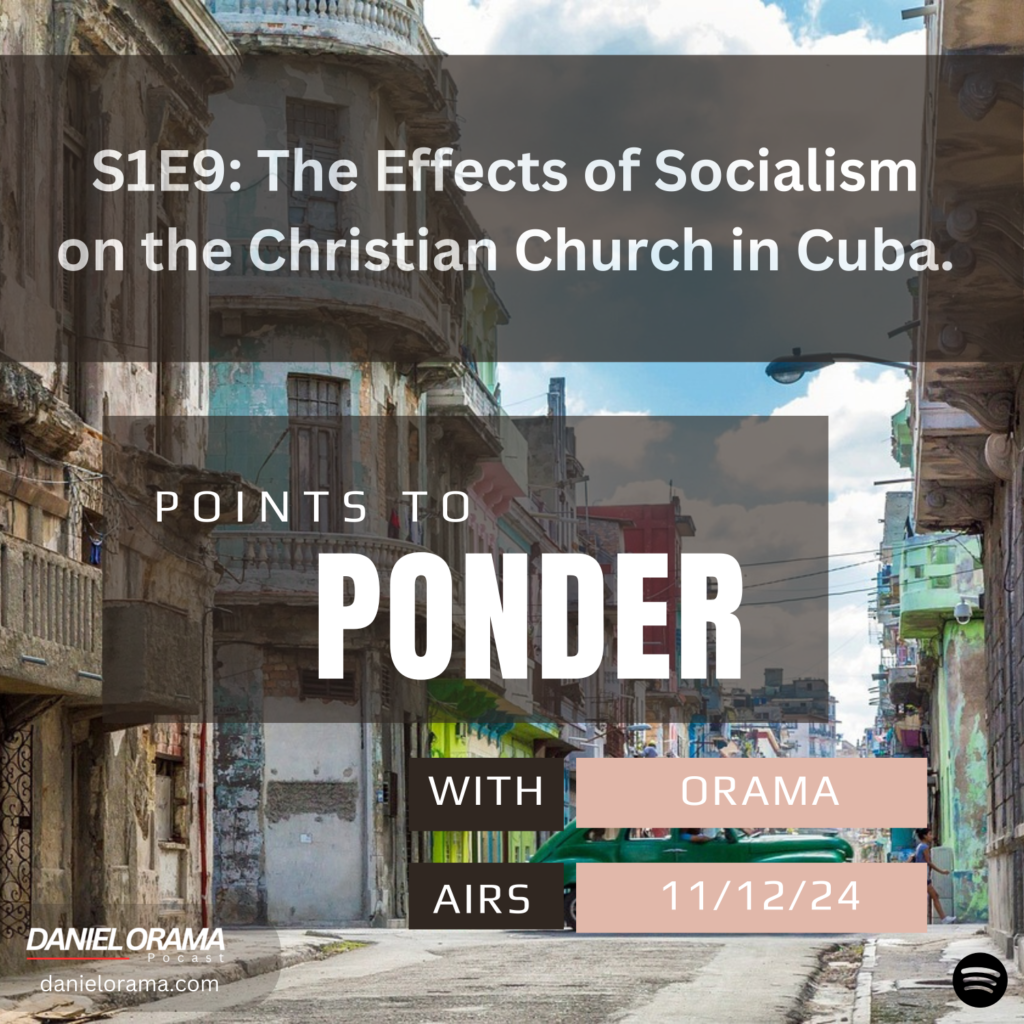Socialism, a Foundational Stone of Communism
Socialism sounds just so nice and soft. Socialism sounds better than Communism, but that is not the case today. If you did not listen to episode 6 of George Carlin – Euphemisms, Soft Language, 1990, you have to go back and give it a listen. According to Socialism, a social-economic system is one under which the production components are owned, administered, and controlled by the people – the workers.”[1] Sound familiar? Yes, the struggle we are in today where Socialism serves as the first stone of turning the world over to Communism.
According to author Gregory Baum, the churches in Cuba underwent a significant transformation due to ideological forces. The author notes that “we can see a political, economic, and social system-socialism-as the force playing the missionary role. “[2] The economic hardships of Cuba were blamed on the blockade the United States imposed, preventing the academic and the church from learning more about what is called the “Cuban reality,” which was the new implementation of Fidel’s Marxist ideologies. Despite the academic and church communities’ inability to access information about Cuba’s reality due to the United States blockade, Fidel’s own decisions ultimately determined the consequences they faced.
A New Non-Biblical Theology in the Church
Church leaders such as Sergio Arce reveal a new theology based on the changes in socialism in Cuba. Arce openly acknowledged that he is a Christian because his parents are Christians, which raises concerns about his salvation and leadership within the church. In his exact words, he said, “I am a Christian because my parents were Christians.”[3] The basis for Arce’s Christianity could work within the confines of Marxist thinking, explaining further that his Christianity was not one of establishment but rather “that an entire home can be a temple in which the presence of God is evident at all times.”[4]
The Scriptures state that the Holy Spirit resides in believers in Christ by personal choice, not by upbringing, “Or do you not know that your body is the temple of the Holy Spirit who is in you, whom you have from God, and you are not your own” (1 Corinthians 6:19, NKJV). Christian parents do not determine a person’s salvation, “Most assuredly, I say to you, unless one is born again, he cannot see the kingdom of God” (John 3:3, NKJV). Arce’s revolutionary ideals have challenged traditional biblical theology. However, he sees himself as a Christian because he aligns with a society that values human dignity and prioritizes it in their goals and accomplishments. Aligning oneself with values found in the Bible does not make you a Christian.
Salvation is a Person’s Personal Choice
The Bible teaches that a person’s salvation is a personal choice and not determined by their upbringing, values held, or accomplished works. The Holy Spirit resides in believers based on their decision to follow Christ. Choosing to follow Christ means that the Holy Spirit resides within the person. However, the church faces a challenge in reconciling biblical teachings with the ideals of the Revolution. Arce’s belief that being part of a revolutionary society automatically makes one a Christian seems contradictory to the Bible’s teaching that faith is a personal revelation from God. According to the Scriptures, “Blessed are you, Simon Bar-Jonah, for flesh and blood has not revealed this to you, but My Father who is in heaven” (Matthew 16:17, NKJV). What is the discovery? That Jesus is the Christ, the Son of the living God.
Due to the introduction of new ideologies that were transforming Cuba, the Cuban Church became divided. Despite their efforts, church leaders were unable to stand against the Marxist Christians who began to erode the church. As one author said, “The Church, fragmented, unsure, too closely linked with foreigners and the rich, challenged a popular government and was resoundingly and humiliatingly defeated.”[5] Bishop Evelio Diaz and other church leaders supported the agrarian reform law, which further deepened the divisions within the church and caused non-believers to emerge in Cuba.
Divisions in the Church Today
Do divisions within the church sound familiar? Today, in the United States, deep divisions in the church have caused split after split with no end in sight. We will dive into church history to identify the divisions within the church. What is difficult to stomach is that Heaven suffered a division that would still affect the church. The first division is Lucifer wanting the throne of God, which created a division that led to a third of the angels of Heaven to rebel. In Luke 10:18, Jesus said He witnessed Lucifer’s fall, “And He said to them, “I saw Satan fall like lightning from heaven” (Luke 10:18, NKJV).
In Colossians, divisions caused the Apostle Paul to intervene. The Gnostics taught that salvation came by gaining secret knowledge (called gnosis), which only few could attain through rare insights and mystic understandings (Colossians 2:1–3, ESV). In other words, the Gnostics’ belief was a work representation of their acquired knowledge for salvation. Paul warned them, “Beware lest anyone cheat you through philosophy and empty deceit, according to the tradition of men, according to the basic principles of the world, and not according to Christ” (Colossians 2:8, NKJV). This is why, as believers in Christ and the Word of God, we cannot spiritualize the text to suit our own interpretation or agenda. Once we cross that line, our limited belief is woven into the fabric of the Word of God. The Word of God says what it says, not what we believe. We believe in the Word of God, not in what we believe. I hope that makes sense because it is a fine line between falling into the manipulation of Scripture, which is what Fidel and his communist regime used to confuse the Christian church in Cuba.
Lastly, divisions that we see in the church today that are causing splits, which is a divide and conquer method, is homosexuality. In an article in USA Today by Kayla Jimenez, “The United Methodist Church has experienced a denominational schism. Thousands of congregations have left the church due to contentious debates over sexuality, including a dispute over whether to accept gay marriage and LGBTQ+ pastors. Progressives are expected to propose changing church law at the next General Conference in 2024 to allow for same-sex marriage and the ordination of LGBTQ people.” Listen, the Bible is clear on this subject matter, and since the Bible is the inerrant Word of God, there is no debate. It just becomes whether obedience plays a part in surrendering to the authority of the Word of God. Then there is the matter of women pastors in the church, social justice, or, should I say, social revenge that has created more divisions within the church. To dismantle the Christian church, one only has to continue driving the wedge of divisions in the church.
Due to the introduction of new ideologies of Marxism, socialism, and communism, which were instrumental in transforming Cuba, the Cuban Church became divided because they did not submit to the authority of the Word of God, which resulted in a watered-down agenda-driven dismantling of the church. Despite their efforts, church leaders were unable to stand against the Marxist Christians who began to erode the church. As one author, Margaret Crahan, “The Church, fragmented, unsure, too closely linked with foreigners and the rich, challenged a popular government and was resoundingly and humiliatingly defeated.”[6]
Of course, education was a top priority for Fidel because he knew the way to get to the heart of change was through the education system. Cuba had a picture in mind of what they wanted, the final product of reaching adulthood. The Communist regime produced a plan and began assimilating an entire nation; that took roughly 20 years to put the nail in the coffin completely. Generations were raised with disbelief in God; Jesus never existed because science had proven otherwise and turned these new robots of the machine into the Christian church.
[1] What is socialism? Definition and meaning – Market Business News.
[2] Gregory Baum, “The Church and Socialism: Reflections from a Cuban Context” Horizons 14, no. 1 (1987): 186–87. (New York, NY: Circus, 1986), 10.
[3] Sergio Arce, “The Church and Socialism: Reflections from a Cuban Context” Horizons 14, no. 1 (1987): 186–87. (New York, NY: Circus, 1986), 3.
[4] Ibid., 4.
[5] Margaret E. Crahan, “Cuba: Religion and Revolutionary Institutionalization.” Journal of Latin American Studies 17, no. 2 (1985), 325.
[6] Margaret E. Crahan, “Cuba: Religion and Revolutionary Institutionalization.” Journal of Latin American Studies 17, no. 2 (1985), 325.

